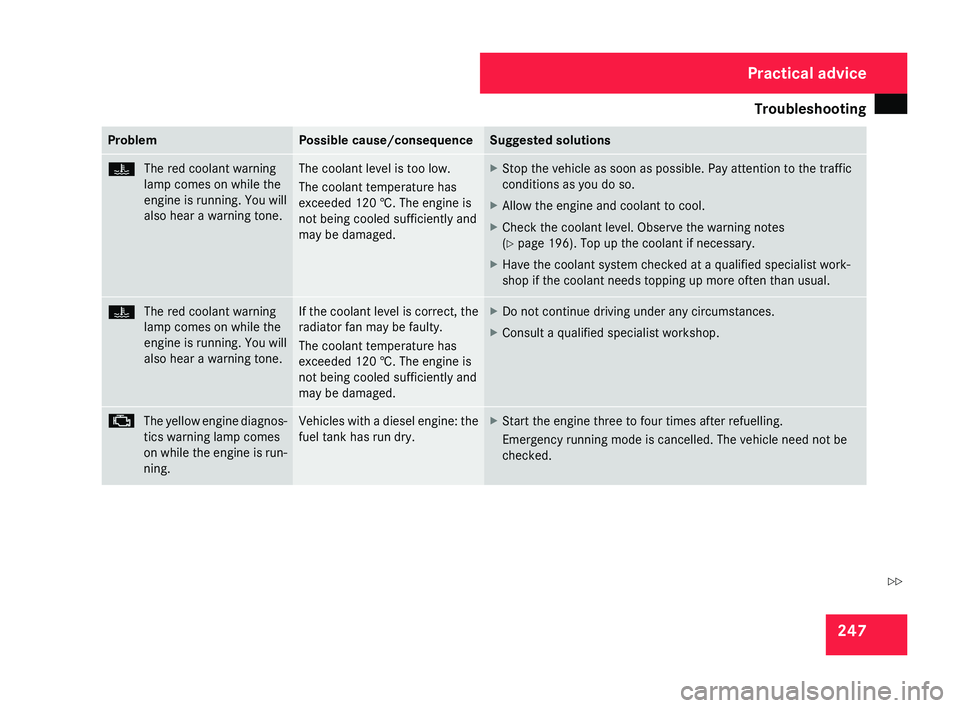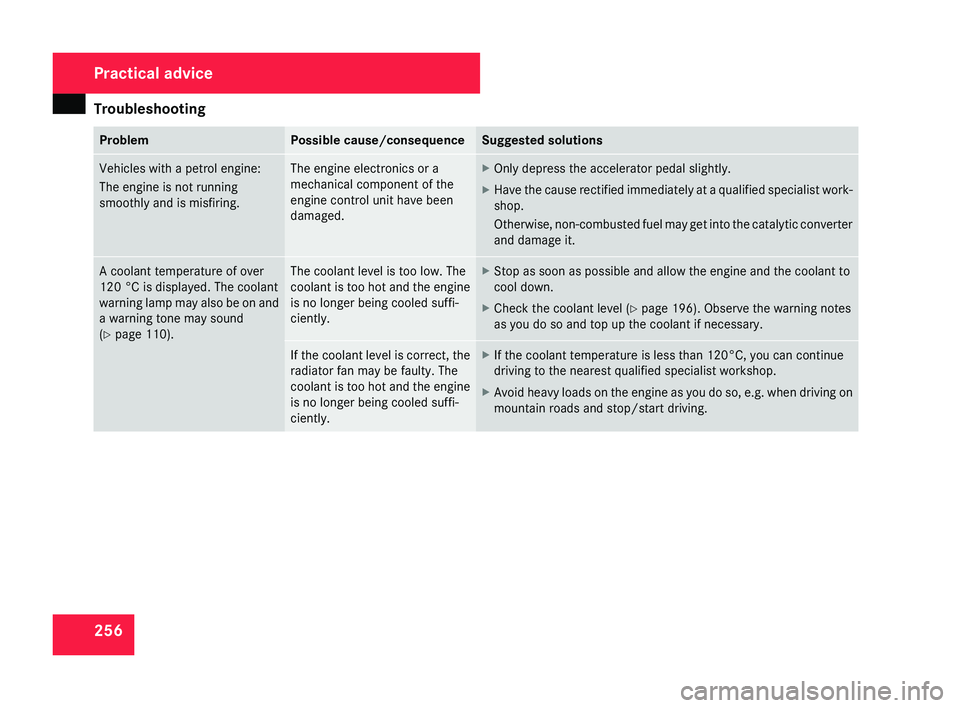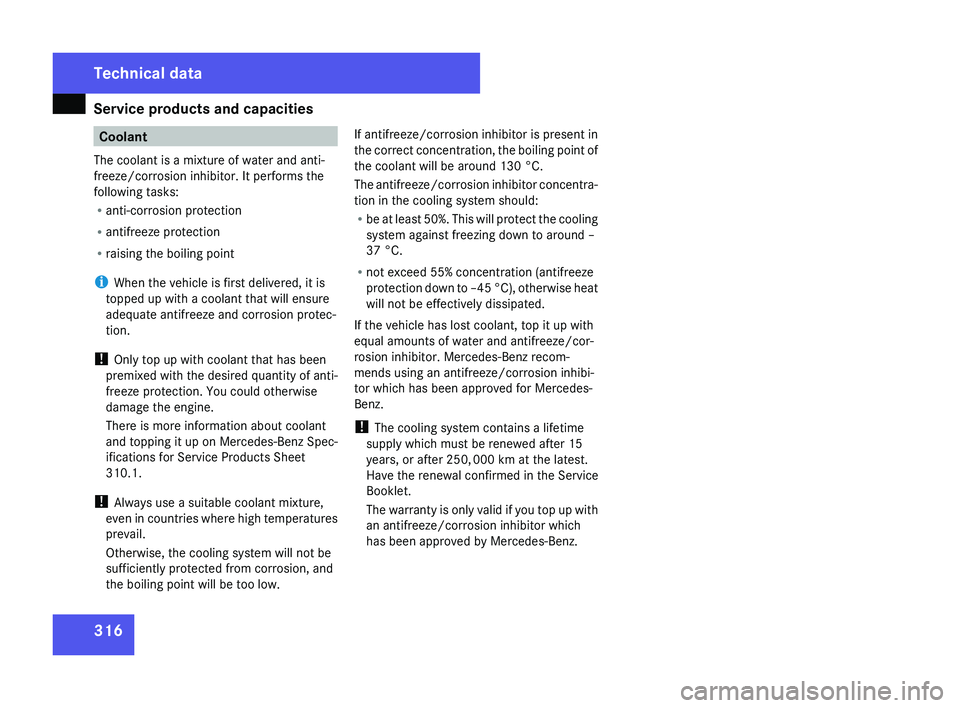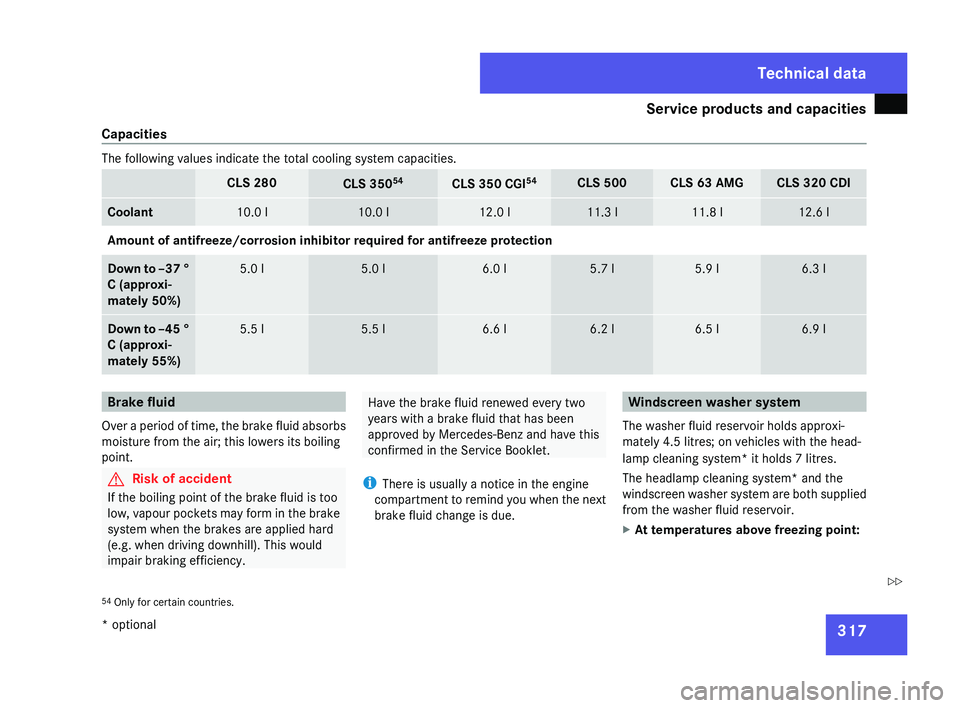Page 240 of 329

Display messages
237Display messages Possible cause/consequence Possible solution
N Check engine oil
level when next
refuelling The engine oil level has dropped to a crit-
ical level. X
Check the engine oil level (Y page 195) and top
up the engine oil if necessary.
X Have the engine checked for leaks if the engine
oil needs topping up more often than usual. ± Display malfunc-
tion Consult work-
shop One or more electronic systems are
unable to deliver information to the on-
board computer. The following systems
may have failed:
R
Coolant temperature gauge
R Rev counter
R Cruise control or Speedtronic display X
Visit a qualified specialist workshop. H Tyre pressure Cau-
tion Tyre defect One or more tyres are losing air rapidly.
The affected wheel is highlighted in the
tyre pressure display of the tyre pressure
monitor*. X
Stop the vehicle without making any sudden
steering
or braking manoeuvres. Pay attention
to the traffic conditions as you do so.
X Repair or change the tyre (Y page 276). Practical advice
* optional
219_AKB; 2; 4, en-GB
mkalafa,
2007-11-13T09:28:36+01:00 - Seite 237 Z
Page 249 of 329

Troubleshooting
246 Problem Possible cause/consequence Suggested solutions
l
The red distance warning
lamp* lights up while the
vehicle is in motion. You
will also hear a warning
tone. G
Risk of accident
You are approaching a vehicle in
front at too great a speed or Dis-
tronic*
has detected a stationary
obstacle in your line of travel. X
Be prepared to brake immediately.
X Pay careful attention to the traffic situation. You may have to brake
or take evasive action. D
The red coolant warning
lamp comes on while the
engine is running. There is insufficient coolant in the
expansion tank.
The coolant is too hot and the
engine is no longer being cooled
sufficiently. X
Stop the vehicle as soon as possible. Pay attention to the traffic
conditions as you do so.
X Allow the engine and coolant to cool.
X Check the coolant level. Observe the warning notes
(Y page 196). Top up the coolant if necessary.
X Have the coolant system checked at a qualified specialist work-
shop if the coolant needs topping up more often than usual. D
The red coolant warning
lamp comes on while the
engine is running. If the coolant level is correct, the
radiator fan may be faulty.
The coolant is too hot and the
engine is no longer being cooled
sufficiently. X
If the coolant temperature is less than 120†, you can continue
driving to the nearest qualified specialist workshop.
X In doing so, avoid heavy loads on the engine (e.g. driving in moun-
tainous terrain) and stop-and-go driving. Practical advice
* optional
219_AKB; 2; 4, en-GB
mkalafa,
2007-11-13T09:28:36+01:00 - Seite 246
Page 250 of 329

Troubleshooting
247Problem Possible cause/consequence Suggested solutions
D
The red coolant warning
lamp comes on while the
engine is running. You will
also hear a warning tone. The coolant level is too low.
The coolant temperature has
exceeded 120 †. The engine is
not being cooled sufficiently and
may be damaged. X
Stop the vehicle as soon as possible. Pay attention to the traffic
conditions as you do so.
X Allow the engine and coolant to cool.
X Check the coolant level. Observe the warning notes
(Y page 196). Top up the coolant if necessary.
X Have the coolant system checked at a qualified specialist work-
shop if the coolant needs topping up more often than usual. D
The red coolant warning
lamp comes on while the
engine is running. You will
also hear a warning tone. If the coolant level is correct, the
radiator fan may be faulty.
The coolant temperature has
exceeded 120 †. The engine is
not being cooled sufficiently and
may be damaged. X
Do not continue driving under any circumstances.
X Consult a qualified specialist workshop. ±
The yellow engine diagnos-
tics warning lamp comes
on
while the engine is run-
ning. Vehicles with a diesel engine: the
fuel tank has run dry. X
Start the engine three to four times after refuelling.
Emergency running mode is cancelled. The vehicle need not be
checked. Practical advice
219_AKB; 2; 4, en-GB
mkalafa,
2007-11-13T09:28:36+01:00 - Seite 247 Z
Page 259 of 329

Troubleshooting
256 Problem Possible cause/consequence Suggested solutions
Vehicles with a petrol engine:
The engine is not running
smoothly and is misfiring. The engine electronics or a
mechanical component of the
engine control unit have been
damaged. X
Only depress the accelerator pedal slightly.
X Have the cause rectified immediately at a qualified specialist work-
shop.
Otherwise,
non-combusted fuel may get into the catalytic converter
and damage it. A coolant temperature of over
120 °C is displayed. The coolant
warning
lamp may also be on and
a warning tone may sound
(Y page 110). The coolant level is too low. The
coolant
is too hot and the engine
is no longer being cooled suffi-
ciently. X
Stop as soon as possible and allow the engine and the coolant to
cool down.
X Check the coolant level (Y page 196). Observe the warning notes
as you do so and top up the coolant if necessary. If the coolant level is correct, the
radiator fan may be faulty. The
coolant
is too hot and the engine
is no longer being cooled suffi-
ciently. X
If the coolant temperature is less than 120°C, you can continue
driving to the nearest qualified specialist workshop.
X Avoid heavy loads on the engine as you do so, e.g. when driving on
mountain roads and stop/start driving. Practical advice
219_AKB; 2; 4, en-GB
mkalafa,
2007-11-13T09:28:36+01:00 - Seite 256
Page 319 of 329

Service products and capacities
316 Coolant
The coolant is a mixture of water and anti-
freeze/corrosion inhibitor. It performs the
following tasks:
R anti-corrosion protection
R antifreeze protection
R raising the boiling point
i When the vehicle is first delivered, it is
topped up with a coolant that will ensure
adequate antifreeze and corrosion protec-
tion.
! Only top up with coolant that has been
premixed
with the desired quantity of anti-
freeze protection. You could otherwise
damage the engine.
There is more information about coolant
and topping it up on Mercedes-Benz Spec-
ifications for Service Products Sheet
310.1.
! Always use a suitable coolant mixture,
even in countries where high temperatures
prevail.
Otherwise, the cooling system will not be
sufficiently protected from corrosion, and
the boiling point will be too low. If antifreeze/corrosion inhibitor is present in
the
correct concentration, the boiling point of
the coolant will be around 130 °C.
The antifreeze/corrosion inhibitor concentra-
tion in the cooling system should:
R be at least 50%. This will protect the cooling
system against freezing down to around –
37 °C.
R not exceed 55% concentration (antifreeze
protection down to –45 °C), otherwise heat
will not be effectively dissipated.
If the vehicle has lost coolant, top it up with
equal amounts of water and antifreeze/cor-
rosion inhibitor. Mercedes-Benz recom-
mends using an antifreeze/corrosion inhibi-
tor which has been approved for Mercedes-
Benz.
! The cooling system contains a lifetime
supply which must be renewed after 15
years, or after 250, 000 km at the latest.
Have the renewal confirmed in the Service
Booklet.
The warranty is only valid if you top up with
an antifreeze/corrosion inhibitor which
has been approved by Mercedes-Benz. Technical data
219_AKB; 2; 4, en-GB
mkalafa,
2007-11-13T09:28:36+01:00 - Seite 316
Page 320 of 329

Service products and capacities
317
Capacities The following values indicate the total cooling system capacities.
CLS 280
CLS 350
54 CLS 350 CGI
54 CLS 500 CLS 63 AMG CLS 320 CDI
Coolant 10.0 l 10.0 l 12.0 l 11.3 l 11.8 l 12.6 l
Amount of antifreeze/corrosion inhibitor required for antifreeze protection
Down to –37 °
C (approxi-
mately 50%) 5.0 l 5.0 l 6.0 l 5.7 l 5.9 l 6.3 l
Down to –45 °
C (approxi-
mately 55%) 5.5 l 5.5 l 6.6 l 6.2 l 6.5 l 6.9 l
Brake fluid
Over a period of time, the brake fluid absorbs
moisture from the air; this lowers its boiling
point. G
Risk of accident
If the boiling point of the brake fluid is too
low,
vapour pockets may form in the brake
system when the brakes are applied hard
(e.g. when driving downhill). This would
impair braking efficiency. Have the brake fluid renewed every two
years with a brake fluid that has been
approved by Mercedes-Benz and have this
confirmed in the Service Booklet.
i There is usually a notice in the engine
compartment
to remind you when the next
brake fluid change is due. Windscreen washer system
The washer fluid reservoir holds approxi-
mately 4.5 litres; on vehicles with the head-
lamp cleaning system* it holds 7 litres.
The headlamp cleaning system*
and the
windscreen washer system are both supplied
from the washer fluid reservoir.
X At temperatures above freezing point:
54 Only for certain countries. Technical data
* optional
219_AKB; 2; 4, en-GB
mkalafa,
2007-11-13T09:28:36+01:00 - Seite 317 Z